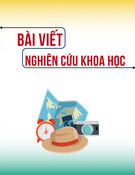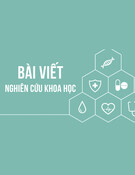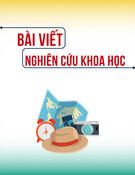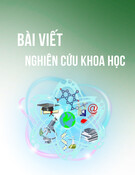
p-ISSN 1859-4417 e-ISSN 3030-4822
118
Summary
Based on theoretical and practical foundations, combined with methods such as documents
analysis and synthesis, surveys using questionnaires, and statistical mathematics, this research
evaluates the current status of student sports clubs at Hue University. It identifies the necessity,
significance, and importance of developing recreational sports clubs for university students. The
proposed recreational sports club model for Hue University students has shown initial effectiveness
in improving both physical and mental health.
Keywords: Club; Sports; Model; Recreational Sports; Hue University Students.
(1)PhD, (2)Master, Faculty of Physical Education – Hue University
Nguyen The Tinh(1); Pham Van Hieu(1)
Nguyen Dinh Duy Nghia(2)
INTRODUCTION
In recent years, school-based sports activities
have seen significant growth, with innovative
and diverse approaches that have garnered
positive attention from society. Competitions for
students have been regularly maintained and
developed, attracting substantial participation in
training and events. Athletic performance
among students has improved, with talented
individuals identified for further training to
contribute to the nation's high-performance
sports teams. A key objective of higher
education, as stipulated in the Higher Education
Law, is to train learners to maintain good health.
Recreational sports contribute to physical and
mental well-being. Thus, the establishment of
recreational sports clubs (RSCs) within higher
education institutions is crucial for both students
and the general community. This study aims to
build a functional model of RSCs for Hue
University students by assessing their necessity,
significance, and demand for such clubs. RSCs
play a vital role in life by offering opportunities
for relaxation, enjoyment, and social
engagement, regardless of whether activities
occur indoors or outdoors. They cater to the
physical and emotional needs of individuals,
providing entertainment, social connections, and
lifestyle improvements. For students, RSCs
offer a unique platform for recreation and
physical fitness during their free time. They
focus less on competition and more on
enjoyment, making them particularly appealing
to young people. These clubs not only provide
joy from overcoming challenges or competing
but also significantly enhance physical health
and overall fitness. From this perspective, the
study "Developing a Recreational Sports Club
Model for Students at Hue University" was
conducted to meet these needs.
RESEARCH METHODS
The study employed a combination of
research methods, including document analysis
and synthesis, questionnaire surveys, and
statistical mathematics.
Interviews were conducted with 10 faculty
members, administrators, and experts
(collectively referred to as "lecturers") and 865
students to assess the necessity, significance,
demand, and proposed structure of recreational
sports clubs (RSCs) at Hue University.
RESULTS AND DISCUSSION
1. Necessity, Significance, and Demand
for Establishing and Developing
Recreational Sports Clubs at Hue University
1.1. Necessity of Establishing and
Developing Recreational Sports Clubs
To evaluate the necessity of RSCs at Hue
University, 865 students and 10 lecturers were
interviewed. The results are presented in Table 1.
DEVELOPING A RECREATIONAL SPORTS CLUB MODEL FOR
STUDENTS AT HUE UNIVERSITY

119
Sè §ÆC BIÖT / 2024
The findings in Table 1 indicate that of the
865 student respondents, 551 (63.70%)
considered the establishment and development
of RSCs to be very necessary, and 154 (17.80%)
found it fairly necessary. Only 14.22% viewed
it neutrally, while a combined 4.28% regarded
it as not necessary or not at all necessary.
These results reflect a strong awareness among
students of the cultural and recreational benefits,
the importance of physical training, and the need
for recreational sports activities. Moreover, among
the 10 lecturers surveyed, 60% deemed RSCs very
necessary, while 30% rated them as fairly
necessary, and 10% viewed them neutrally.
This data demonstrates that both students and
faculty members at Hue University recognize
the critical role of RSCs in improving physical
education and overall well-being. Globally,
organized recreational sports clubs have been
implemented in schools to foster communal
physical activity while enhancing individual
skills and athletic performance. These findings
align with successful international practices in
developing recreational sports for students,
faculty, and staff.
1.2. Significance of Establishing and
Developing Recreational Sports Clubs
To determine the significance of RSCs for
Hue University students, surveys were
conducted with 10 lecturers and 865 students.
The results are detailed in Tables 2 and 3.
Table 1. Necessity of Establishing and Developing
Recreational Sports Clubs at Hue University
Level
Students (n=865) Lecturers (n=10)
n%n%
1. Not at all necessary 14 1.62 00
2. Not necessary 23 2.66 00
3. Neutral 123 14.22 1 10
4. Fairly necessary 154 17.8 3 30
5. Very necessary 551 63.7 6 60
Table 2. Lecturer Survey on the Significance
of Establishing Recreational Sports Clubs (n = 10) (%)
No. Significance Strongly
Agree Agree Neutral Disagree Strongly
Disagree
1 Enhances health 60 30 10 00
2 Improves physical appearance 40 30 20 10 0
3 Provides mental relaxation 80 10 10 00
4 Enhances motor skills 40 50 10 00
5 Supports weight loss 50 30 10 10 0
6 Prevents illnesses 60 10 20 10 0
7 Offers entertainment 40 20 20 10 10
8 Reduces stress 50 40 10 00
9 Promotes social integration 40 30 20 10 0
10 Others:……………….. 40 30 10 10 10

p-ISSN 1859-4417 e-ISSN 3030-4822
120
Tables 2 and 3 illustrate that both lecturers
and students strongly agreed on the significance
and importance of establishing RSCs.
Specifically:
Lecturers' Perspectives: The combined
responses of "Strongly Agree" and "Agree"
accounted for a high proportion of opinions
across several factors: enhancing health, mental
relaxation, improving motor skills, and stress
reduction (90% agreement). Weight loss was
highlighted by 80%, while improving physical
appearance, disease prevention, and social
integration were recognized by 70% of
respondents. The lowest agreement, at 60%, was
for entertainment and cheering activities.
Students' Perspectives: Among students,
stress reduction was the most highly valued
benefit, with 93.76% of respondents agreeing or
strongly agreeing. This was followed by health
enhancement (89.71%), weight loss (84.51%),
mental relaxation (83.82%), and improved
motor skills (76.42%). Other factors were
comparatively less emphasized in student
responses.
These results reveal that both lecturers and
students recognize the critical role of RSCs in
promoting physical and mental well-being.
Their establishment and development are
viewed as essential to enhancing the health and
quality of life of Hue University students.
2. Criteria for Establishing Recreational
Sports Clubs
To establish clear criteria for RSCs at Hue
University, two rounds of surveys were
conducted with 10 experts, including scientists,
administrators, and lecturers. Each round was
spaced seven days apart to validate the
consistency of responses. The findings are
presented in Table 4.
Based on expert opinions, criteria with an
agreement level of 80% or higher were selected
for the detailed development of the recreational
sports club (RSC) model. Through structured
interviews, the proposed criteria were
incorporated into the framework for establishing
the RSC model for Hue University students.
3. Development of the RSC Establishment
and Operational Procedure
To design a scientifically appropriate and
practical process for forming RSCs at Hue
University, two rounds of surveys were
conducted with 10 lecturers using structured
questionnaires, spaced seven days apart. This
ensured a comprehensive understanding of the
requirements for establishing and operating
RSCs. Table 5 summarizes the survey results.
Based on the lecturers' responses, procedures
with an agreement rate of 80% or higher were
selected for the establishment process. The
proposed seven-step procedure was
unanimously endorsed with approval ratings
Table 3. Student Survey on the Significance of Participating
in Recreational Sports Clubs (n = 865) (%)
No. Significance Strongly
Agree Agree Neutral Disagree Strongly
Disagree
1 Enhances health 52.37 37.34 7.28 2.54 0.46
2 Improves physical appearance 32.02 33.29 20.23 10.29 4.16
3 Provides mental relaxation 67.28 16.53 10.87 4.28 1.04
4 Enhances motor skills 30.75 45.66 10.29 5.32 7.98
5 Supports weight loss 39.88 44.62 9.02 1.73 4.74
6 Prevents illnesses 27.05 24.51 21.39 19.88 7.17
7 Offers entertainment 17.69 11.91 63.12 4.16 3.12
8 Reduces stress 63.24 30.52 0.35 0.46 5.43
9 Promotes social integration 32.83 37.57 17.69 9.71 2.2
10 Others:……………….. 14.1 16.07 10.64 6.24 52.95

121
Sè §ÆC BIÖT / 2024
Table 4. Survey Results on Criteria for Establishing Recreational Sports Clubs (n = 10)
No. Criteria
Survey round 1 Survey round 2
Agree Disagree Agree Disagree
mi%m
i%m
i%m
i%
1 Necessity 10 100 00990 1 10
2 Legal Basis 8 80 2 20 9 90 1 10
3 Objectives 8 80 2 20 8 80 2 20
4 Goals 9 90 1 10 9 90 1 10
5 Target Participants 9 90 1 10 8 80 2 20
6Organizational Structure
and Operations 9 90 1 10 9 90 1 10
7 Operational Regulations 8 80 2 20 9 90 1 10
8 Impact and Effectiveness 9 90 1 10 9 90 1 10
9 Feasibility 8 80 2 20 8 80 2 20
10 Risk Assessment 9 90 1 10 9 90 1 10
11 Budget Allocation 8 80 2 20 9 90 1 10
12 Implementation Plan 10 100 0010 100 00
13 Execution 8 80 2 20 8 80 2 20
Table 5. Summary of Survey Results on the Establishment
and Operational Procedure for RSCs (n = 10)
TT Procedure
Survey round 1 Survey round 2
Agree Disagree Agree Disagree
n%n%n%n%
1Submit a proposal to Hue
University Director 9 90 1 10 10 100 00
2Develop an RSC activity
proposal 9 90 1 10 10 100 00
3Survey the current state of RSCs
at Hue University 10 100 0010 100 00
4Explore external RSCs for
benchmarking 9 90 1 10 10 100 00
5Organize a council or electoral
conference (if applicable) 10 100 0010 100 00
6Submit the proposal to Hue
University management 9 90 1 10 10 100 00
7Director approval and
establishment of RSCs 9 90 1 10 10 100 00

p-ISSN 1859-4417 e-ISSN 3030-4822
122
exceeding 90%, affirming its suitability for
forming RSCs at Hue University.
4. Designing the RSC Model for Hue
University Students
To establish a robust RSC model for Hue
University students, the opinions of 10 lecturers
were surveyed. The results are presented in Table
6, which outlines the proposed model's framework
and its acceptance rates among experts.
The survey results in Table 6 indicate that the
majority of lecturers (80%) favored the model
structured as: Board of
Directors/Department/RSC/Executive
Board/Sponsors/Sub-committees. This proposed
structure includes the Executive Board, two
deputy leaders, sponsors, and two sub-
committees (Finance-Administration Sub-
committee and Technical Sub-committee).
Additional participants include students, staff,
employees, and sports practitioners. To illustrate
the proposed structure clearly, we present the
RSC model in Diagram 1 below:
CONCLUSION
The study highlights the critical need to
establish Recreational Sports Clubs (RSCs) to
create conducive environments for sports and
recreational activities among Hue University
students. Despite the demand, current resources
and conditions fall short of enabling regular,
scientifically grounded, and effective physical
activity for students, leading to significant
challenges in practice. Thus, developing an RSC
Table 6. Survey Results on the Recreational Sports Club (RSC) Model
for Hue University Students (n=10)
TT RSC Model Agree Disagree
mi%mi%
1Board of Directors/Department/Division/RSC/ Executive
Board/Sub-committees/Sponsors 0000
2Board of Directors/Department/RSC/ Executive
Board/Sponsors/Sub-committees 880 0 0
3Board of Directors/Union/RSC/Executive Board/Sub-
committees/Sponsors 1 10 00
4Board of Directors/Student Union/RSC/ Executive
Board/Sub-committees/Sponsors 110 00
5Youth Union/RSC/Executive Board/Sub-committees/Sponsors 0000
6Youth Union/RSC/Executive Board/Sub-committees 0000
7Student Union/RSC/Youth Union/RSC/ Executive
Board/Sub-committees/Sponsors 0000
8Department/RSC/Executive Board/Sub-committees/Sponsors 0000
9Department/RSC/Executive Board/Sponsors 0000
10 Board of Directors/RSC Executive Board/Sub-
committees/Sponsors 0000
11 Youth Union/RSC Executive Board/Sub-committees/Sponsors 0000
12 Student Union/RSC Executive Board/Sub-committees/Sponsors 0000
13 Department/RSC Executive Board/Sub-committees/Sponsors 0000
14 Faculty Union/RSC Executive Board/Sub-committees/Sponsors 0000
15 Others: … 0000

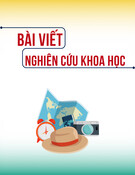
![Đề cương ôn tập Bản đồ du lịch [năm hiện tại]](https://cdn.tailieu.vn/images/document/thumbnail/2025/20250809/dlam2820@gmail.com/135x160/53061754884441.jpg)


